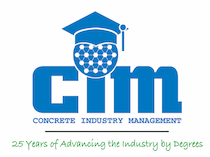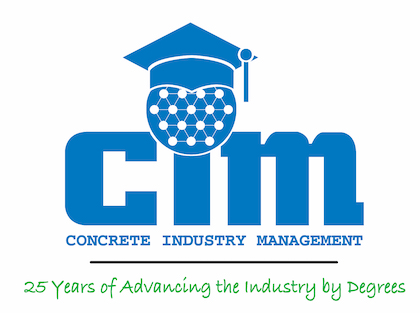Careers in Concrete
 The U.S. concrete industry – a $100 billion industry that employs more than 600,000 people – uses cutting-edge technology to meet the needs of the developers, engineers, architects, city planners, departments of transportation and others who in turn work to meet environmental, community and safety requirements. Concrete is used more innovatively than ever before, creating an urgent need for individuals that possess both focused concrete technology skills and a broad education to move the industry forward.
The U.S. concrete industry – a $100 billion industry that employs more than 600,000 people – uses cutting-edge technology to meet the needs of the developers, engineers, architects, city planners, departments of transportation and others who in turn work to meet environmental, community and safety requirements. Concrete is used more innovatively than ever before, creating an urgent need for individuals that possess both focused concrete technology skills and a broad education to move the industry forward.
When concrete is required, there have to be professionals trained in concrete technology, operations and management. The concrete industry is looking to the CIM program to develop the workforce for these important roles, forming the framework for the future of the concrete industry.
Where can a degree in CIM take you?
CIM graduates are hired for management positions throughout the concrete industry including production, material supply, contracting and manufacturing. More than 1,275 students have graduated from CIM programs with starting salaries competitive with other high-tech industries. Examples of careers upon graduation include:
- Operations manager: Manages all production operations. Provides overall leadership and direction to those responsible for production, sanitation, distribution logistics and maintenance operations.
- Logistics specialist: Schedules and dispatches workers and work crews, equipment and service vehicles for conveyance of materials, freight (both import and export) or passengers and/or normal installation, service or emergency repairs rendered outside the place of business.
- Laboratory researcher: Participates in a variety of research or analytical laboratory support activities for a testing or research program. Requires knowledge of laboratory methods, practices, procedures, policies, regulations, laboratory materials and equipment.
- Construction superintendent: Oversees the operations of a construction site from planning to operation. Works in the field daily scheduling and supervising all activities, ensuring the safety and compliance of the site.
- Plant manager/Plant superintendent: Manages the daily operations of the plant including meeting production goals, motivating employees, fostering teamwork and ensures daily productivity and safety objectives.
- Human resources manager: Recruits, screens, interviews and places employees. Handles employee relations, payroll, benefits and training. Plans, directs and coordinates the administrative functions of an organization.
- Environmental specialist: Ensures environmental compliance, develops sustainability programs and ensures compliance with hazardous material regulations. Develops and maintains systems identifying location of hazardous materials; runs hazardous material training programs.
- Project manager: Budgets, coordinates, oversees and plans construction projects from start to finish.
- Entrepreneur: Plans and directs company operations. Creates policies, sets goals and meets with potential investors and clients. Entrepreneurs involved with daily tasks also hire staff and prepare work schedules.
- Safety manager: Provides safety services and assesses risk to the health and safety of employees and the environment, ensures compliance with regulations, analyzes trends and regulatory environments and reviews safety statistics. Employers include quarries, concrete producers or cement companies and contractors.
- Virtual design and construction (VDC) manager: Assists project teams and implements technology like Building Information Modeling (BIM) and virtual design and construction methodologies.
- Quality control/Quality assurance manager: Assures products or materials meet standards and don’t deviate from specifications. Work environment and job duties can vary. Employers include concrete producers engineering firms and testing agencies.
- Field/Technical services manager: Monitors and assures the quality of constituent materials and concrete mixes. Assigns field/service staff to a wide variety of duties in the field, laboratory and office as required.
- Estimator: Estimates work required for projects by gathering proposals, blueprints, specifications and related documents.
- Marketing manager: Develops and manages marketing strategy, public relations, branding, digital and communications programs.
- Sales representative: Maintains outstanding customer service, generates sales, merchandising and safeguards company assets. Initiates new sales by relationship development and seeking additional products and services through knowledge of market. Employers include concrete producers or material suppliers, contractors, equipment or software companies.
- Financial and accounting Manager: Trains and supervises accounting staff in the maintenance of financial accounts and preparation of financial reports and performs related duties.
Industry niches and employers are varied and include concrete producers; contractors; cement manufacturers; precast, pipe and block producers; precast/ prestress producers; materials and equipment suppliers; software companies and associations.


